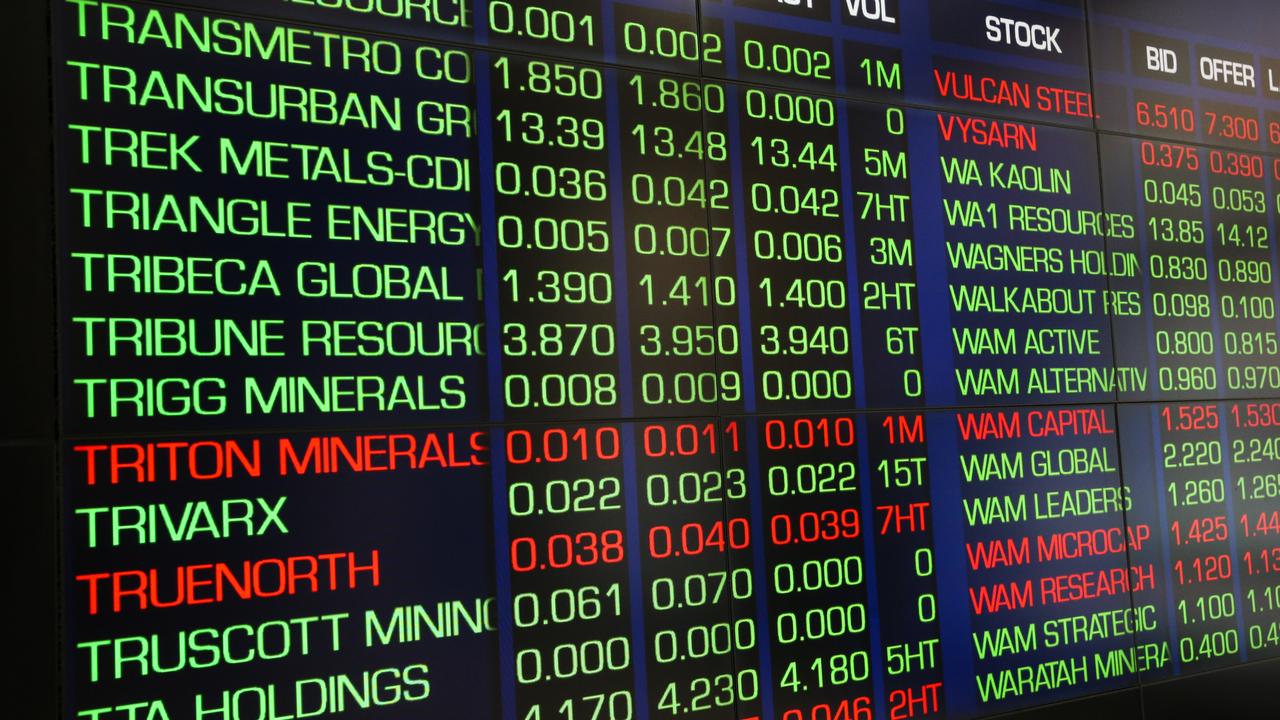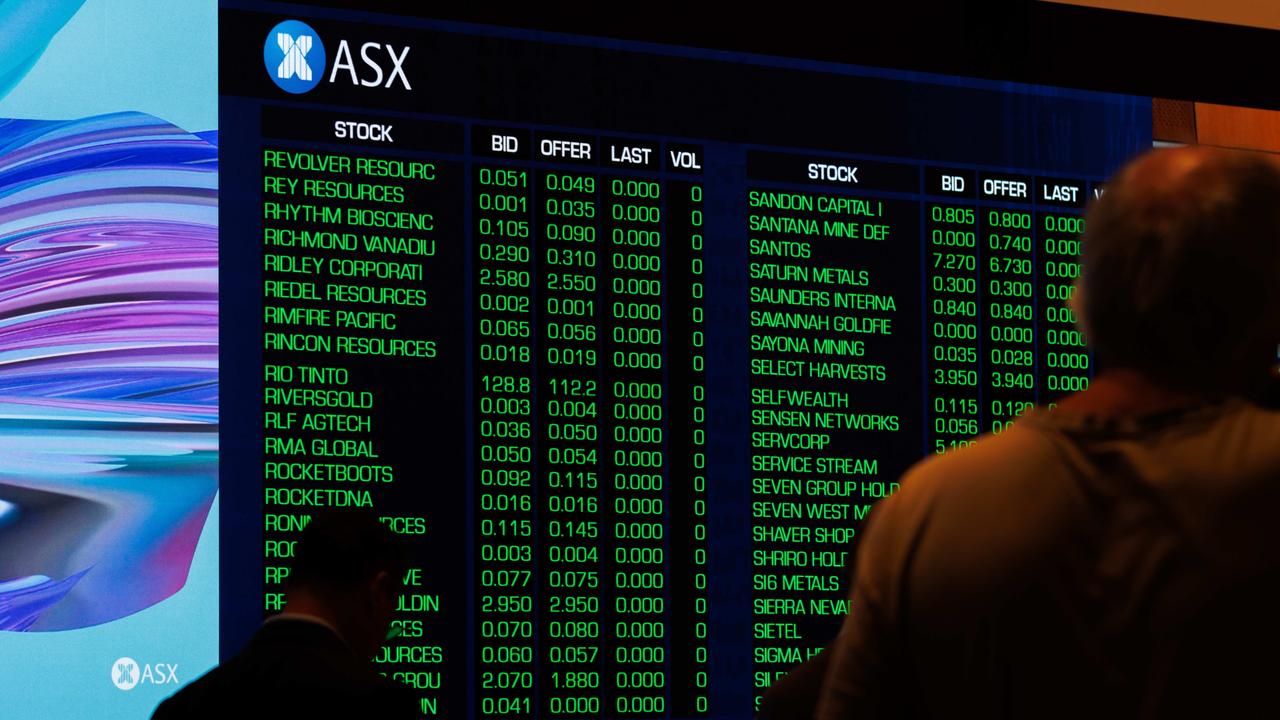ASX edges 0.2pc higher as Afterpay, Appen, Xero set record highs
Shares snagged an 11-point gain as Freedom Foods was halted for a performance update, and a fresh wave of panic buying hit VIC supermarkets.
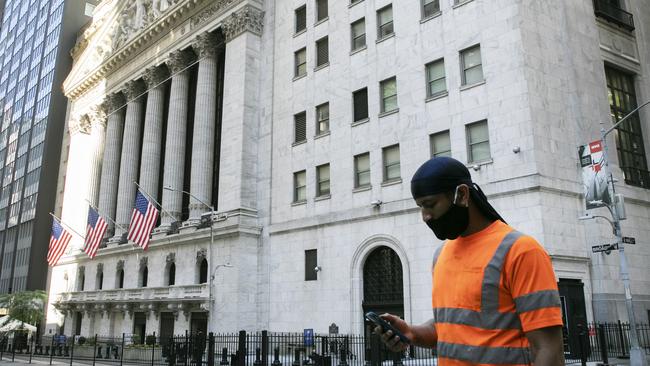
- Woolies reinstates VIC purchase limits
- AMP may be M&A target after Life sale
- Tech surge led by Afterpay, Appen records
- Freedom Foods chief takes leave
That’s all from the Trading Day blog for Wednesday, June 24. Shares finished up 0.2 per cent for their fourth daily gain, fighting back from a midday slip into the negative. It comes as rising coronavirus cases in Victoria prompted Woolworths and Coles to reinstate their purchase limits in some parts of the state. Elsewhere, TPG shareholders passed its proposed merger with Vodafone, while Mirvac slashed the valuation of its property portfolio.
US futures suggest a slip to come on Wall Street tonight.
Nick Evans 8.45pm: Gascoyne Resources facing its future
Australia’s tougher foreign investment rules could become a central issue in the rescue of failed gold miner Gascoyne Resources on Thursday, as creditors meet to decide the fate of a Hong Kong-listed company’s offer to rescue the firm.
Gascoyne’s future ultimately will rest in the hands of its biggest creditor after its administrators recommended against a last-minute bid from a Hong Kong suitor offering to help refloat the company.
ASX-listed NRW Holdings, owed almost $33m for its work at Gascoyne’s Dalgaranga mine in Western Australia, is likely to be the kingmaker at a meeting of the company’s creditors on Thursday, after Hanking this week waged a vigorous campaign to win creditor backing for its proposal to take a share of up to 30 per cent in the company.
David Rogers 8.22pm: Are the bears backed up?
The pushback against high sharemarket valuations continues even as some analyst bears capitulate.
Credit Suisse strategist Jonathan Golub has raised his year-end projection for the S&P 500 to 3200, from 2700, and JPMorgan’s Mislav Matejka this week raised his US recommendation to overweight, from neutral, even as Citi’s Tobias Levkovich doubled down on his bottom-of-the-pack target of 2700.
Goldman Sachs’s David Kostin, with a slightly bearish year-end forecast of 3000 points — in line with the average of a survey by Bloomberg last week — said investors may limit their stock purchases due to the risk of a second wave of coronavirus cases and US election uncertainty.
Damon Kitney 8.05pm: Do you trust your boss?
Employees in major companies and even some board members are not confident their executive leaders will act morally and ethically in the crisis world caused by COVID-19, according to a new global survey.
The EY Global Integrity Report 2020 to be released on Thursday reveals divisions on the repercussions for company ethics as a result of the pandemic as companies come under intense pressure to cut costs to arrest plummeting revenues.
While the majority (90 per cent) of respondents to the survey said the disruption caused by COVID-19 posed a risk to ethical business conduct, there was a big disparity between boards, senior management and employees on the implications for compliance.
While 43 per cent of board members and 37 per cent of senior managers surveyed believed the pandemic could lead to change and better business ethics, only 21 per cent of junior employees agreed.
But 55 per cent of board members also believed there were managers in their organisation who would sacrifice integrity for short-term gain.
“Extreme pressures can lead to moral and ethical decisions that organisations must respond to at speed and under increased scrutiny,” said Andrew Gordon, EY Global forensic and integrity services leader.
Jared Lynch, Damon Kitney 7.48pm: Australia Post ahead of budget
Australia Post has been making more money than it budgeted for in March and April, despite chief executive Christine Holgate pleading with crossbench senators to support regulatory changes to allow the postal service to deliver every other day in cities and extend delivery times on some routes.
In response to a series of questions from Labor senator Kimberley Kitching, Australia Post confirmed that its overall revenue had tracked higher than budget in March and April, due to an online shopping bonanza.
It comes as an inquiry is set to begin into the regulatory changes that the Morrison government granted Australia Post to help it combat the COVID-19 pandemic.
Eli Greenblat 7.25pm: Analysts revise Woolies’ forecasts
Woolworths has faced a slew of revised profit forecasts from analysts in the wake of its trading update on Tuesday, which revealed a blowout in one-off costs to almost $600m, with investors questioning the retailer’s struggling profitability in the face of booming grocery sales.
The new pre-tax earnings guidance provided by Woolworths of $3.2bn to $3.25bn was less than a consensus forecast leading into the trading update of about $3.32bn, and as much as 5 per cent below some analyst estimates as concerns were raised over Woolworths’ failure to gain profit leverage from its investments in capital expenditure.
That capex bill will only grow further with Woolworths announcing this week a plan to build two automated distribution centres in Sydney, costing as much as $780m.
See the new reports from Goldman Sachs, Morgan Stanley. Shares in Woolworths ended down 26c at $36.12.
Mackenzie Scott 7.06pm: A-REITs to ‘remain resilient’
An expected fall in commercial property prices is unlikely to rock Australian real estate investment trusts, with Moody’s tipping the sector to remain resilient.
Australian REITs had a good buffer coming into the coronavirus crisis and were in a better position to weather the economic storm that they were ahead of the 2008 global financial crisis, a new report from Moody’s Investors Service.
Vice president and senior analyst, Saranga Ranasinghe, said this should see the sector continue performing in the face of weak demand and slowing activity.
James Kirby 6.38pm: Alternative rescue plan for Virgin
The last ditch effort from bondholders to try and offer an alternative rescue plan for Virgin Australia marks a milestone for the private investor bond market - thousands of retail investors are on the line in a high stakes deal that is now going to play out in the full glare of national publicity.
For “mum-and-dad” investors the potential returns from the new deal would be many times higher than they might have got under either of the alternative rescue deals put forward by Bain Capital or Cyrus Capital.
The new deal infers a return of about 70c in the dollar for bond holders; the rival deals are expected to return between 10c and 35c.
Ben Wilmot 6.14pm: Dexus shows market strength
Office powerhouse Dexus has completed the sale of a major Sydney tower at a price higher than its book value a year ago and flagged relatively strong property valuations, showing a dip of about $200m, as prime office towers hold up.
The group valued almost all of its properties and is benefiting from top office buildings still being chased by investors and demand for logistics assets rising at a time when shopping centre values are diving.
Dexus announced that 107 of its 118 assets, comprising 42 offices and 65 industrial complexes, had been externally valued, and these had have resulted in a total estimated decrease of about $195m, or 1.2 per cent prior book values.
“Our high quality property portfolios were in a strong position as we entered into a period of uncertainty driven by the onset of the COVID-19 pandemic, with their high occupancy levels, diversified tenant base, and limited new supply coming online in our key office markets,” Dexus chief executive Darren Steinberg said.
He said the valuations showed the resilience of the property portfolios in the uncertain environment. “The office portfolio experienced a circa 1.5 per cent decline on prior book values as a result of the softer assumptions relating to rental growth, downtime and incentives over the next 12 months,” Steinberg said.
The industrial portfolio lifted by about 0.7 per cent, with the Dexus chief pointing to the investment attractiveness of the asset class, which has remained attractive despite harsher economic conditions.
4.41pm: Small gold miners lead resource rush
Gold miners cheered new highs in spot prices overnight – Newcrest added 2.5 per cent to $31.56 as Northern Star gained 4.9 per cent to $14.10 but it was the smaller miners that outperformed – Perseus Mining adding 7.1 per cent to $1.28 as Bellevue Gold surged by 11.3 per cent to $1.18.
Banks were the key drag – swinging through the session but finishing at a loss, despite a 0.3 per cent lift in Commonwealth Bank to $69.24.
Westpac lost 0.4 per cent to $18.06 as ANZ fell 0.8 per cent to $18.83 and NAB finished down 0.6 per cent to $18.55.
Here’s the biggest movers at the close:
4.26pm: Appen, Afterpay, Xero set new records
High growth tech stocks were the key outperformers in Wednesday’s session – following a move higher to new records on the Nasdaq on Tuesday.
Afterpay continued its solid run to burst past $60 a share and notch a fresh all time high of $62.33 after reporting more than 1 million users on its UK platform Clearpay. At the close, the stock was up by a more mild 0.4 per cent to $59.38.
Appen too set a new high of $35.56 after Macquarie rated the stock at Outperform. Shares in the group finished higher by 2.3 per cent to $34.44.
Across the rest of the sector, WiseTech added 0.5 per cent to $22.11 as Xero added 2.1 per cent to $90.67, after a record high of $91.94, and Atium rose 1.6 per cent to $33.33.
4.15pm: Shares edge higher
The local market held on to minor gains at the close thanks to a boost in tech names, offsetting drag from the major banks and industrial stocks.
At its best, the benchmark ASX200 gained as much as 0.6 per cent, but settled to a gain of 11 points or 0.19 per cent at 5965.7 by the close, coming back from midday slip into negative trade.
The close marks a fourth positive session for the local market, albeit only minor gains in each.
On the All Ordinaries, shares added 12 points or 0.2 per cent to 6081.6.
Ben Wilmot 3.54pm: Cromwell lashes out at ARA bid
Cromwell Property Group has lashed out at its Singapore-based major shareholder ARA for making what it dubbed an “opportunistic” proportional takeover offer just a day after the major shareholder flagged its intent to make the $518m move.
The company said ARA’s offer was a discount of at least 10 per cent to its estimated pro forma net tangible assets per share, and argued it ignored the value associated with the funds management unit that controls $8.3bn.
Cromwell also reported a dip in the value of its controversial Polish shopping centre portfolio.
The $2.3bn company claimed the unconventional partial offer undervalued the business and represented a “takeover by stealth”, partly as ARA’s stake could rise to about 49 per cent.
“The Cromwell Board considers the Proportional Offer to be an opportunistic attempt to gain control of Cromwell without offering to acquire all stapled securities or paying an appropriate control premium to Cromwell securityholders,” the company said.
The board is being advised by Goldman Sachs and UBS.
Read more: ARA makes takeover play for Cromwell
Bridget Carter 3.43pm: Genworth raises $148m in bond issue
DataRoom | Genworth Mortgage Insurance is understood to have raised $147.5m for its bond issue at 5 per cent above the Bank Bill Swap Rate.
The funds came as part of an exchange from a former bond and a remaining $52.5m was to be raised on Wednesday, taking its total raise to $200m.
GMA last traded down 3.5pc to $2.20.
Eli Greenblat 3.39pm: Coles brings back shopping limits
Coles has followed Woolworths in bringing back its own buying restrictions for Victoria and some regions of NSW, as the retailers fear a renewed swarm of panic buying will again disrupt grocery supplies.
Coles said Wednesday afternoon it was implementing a number of temporary measures to improve the availability of key food and grocery items in its Victorian supermarkets and to help customers shop safely.
“Following discussion with the Federal and Victorian governments as well as other retailers, Coles is implementing temporary purchase limits for our Victorian supermarkets to help us manage demand for key staple items,” Coles chief executive Steven Cain said.
COL last traded down 0.5pc to $16.58.
3.21pm: Two thirds of businesses report revenue hit
The coronavirus pandemic and associated lockdowns has dented two thirds of Australian businesses, according to the latest survey from the ABS.
Results from the bureau’s business impacts of COVID-19 survey show two thirds of business were hit, and of those, more than 30pc estimated that revenue had fallen by more than half.
Three in five businesses sought external advice in response to the pandemic, the majority (81pc) from banks, lawyers or accountants while 64pc received advice from federal government agencies.
“The survey found that almost two thirds of all business have introduced new hygiene protocols and practices, and 57pc have made changes to meet physical distancing requirements,” head of industry statistics John Shepherd said.
Our latest Business Impacts of COVID-19 survey results are out now at https://t.co/dvEC9NWOOX pic.twitter.com/w4w8aKFfQL
— Australian Bureau of Statistics (@ABSStats) June 24, 2020
3.13pm: Beware of over exuberance: State Street
Rising share prices and deteriorating fundamentals have increased the risk for equity investors, according to State Street Global Advisors’ Australia Head of Portfolio Management, Bruce Apted.
In particular he sees risks for investors if the expected V-shaped recovery doesn’t eventuate.
Sectors that have increased the most in valuations – Energy, Industrials, Information Technology and Consumer Discretionary – are “most at risk should growth expectations slow”.
Mr Apted is avoiding the more expensive parts of the market, with no exposure to Technology and only small exposures in select Industrials and Energy.
“We believe the significant rally in the equity market has factored in considerable good news and places many stocks at a greater risk should the V shaped recovery not occur as expected,” he says. “We are wary of over exuberance and herd behaviour driving short term prices.”
With online brokers reporting an increase in new accounts being opened, Mr Apted also warns that the prevalence of very low cost trading, combined with volatility, financial market liquidity and the COVID-19 lockdown boredom might partially explain the increased presence of online trading.
Bridget Carter 3.02pm: Freedom halted for performance update
DataRoom | Freedom Foods could be making a statement in the coming days about the carrying value of its assets, say sources.
It comes after the $975m dairy and cereal producer on Wednesday announced that managing director, Rory Macleod, was on leave pending a further announcement that was expected to be made early next week.
In afternoon trade shares in the company were halted, pending “a further announcement concerning its financial performance”.
Only a day earlier, Freedom told the market that Campbell Nicholas resigned as chief financial officer.
This morning’s announcement was considered unusual and sent the stock more than 18 per cent lower in morning trade.
DataRoom understands that the spotlight remains on the group over the carrying value of assets and how they are capitalised.
Read more: Freedom Foods tumbles after exec exits
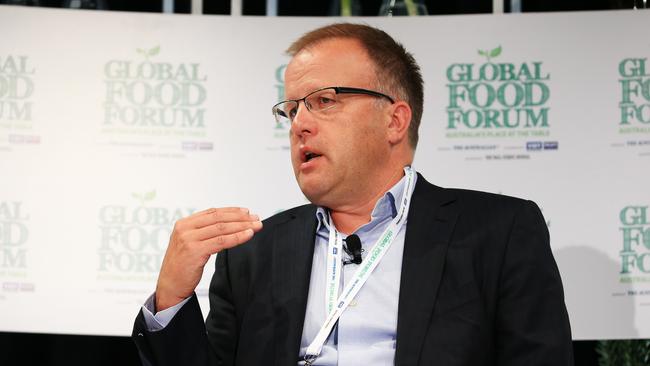
David Swan 2.49pm: Investors clear TPG, Vodafone merger
TPG Telecom shareholders have nearly unanimously approved a deal to merger with Vodafone Hutchinson Australia (VHA), with the blockbuster deal set to complete by July 13.
Next Tuesday June 30, VHA will list on the ASX as TPG Telecom, with Vodafone boss Iñaki Berroeta set to take the reins of the combined company as chief executive.
TPG founder and executive chairman David Teoh will serve as the company’s non-executive chairman.
The combined entity will be known as TPG but Vodafone will retain its consumer branding, as will TPG subsidiaries iiNet and Internode.
TPG shareholders, which voted overwhelmingly in favour of the merger, will receive a fully-franked special dividend of between 49 and 52 cents per share.
TPM last up 0.7pc to $9.04.
Follow the latest in tech news at The Download
Eli Greenblat 2.21pm: Woolies reinstates VIC purchase limits
The spike in coronavirus cases in Victoria and a resumption in some Melbourne suburbs of panic buying at supermarkets has prompted the nation’s biggest grocery chain Woolworths to reinstate purchase limits in the state.
The purchase limits will hit key grocery categories including toilet paper and will revive for many the angst and frustration of three months ago when panic buying saw shoppers strip the shelves of items such as toilet paper, rice and pasta.
However, while those limits were nationwide the decision by Woolworths to reinstate the purchase restrictions will now only apply to Victoria as health officials grow increasingly concerned the state government has lost control of the coronavirus outbreak within its borders.
This 2 item purchase limit will be across the following products in VIC only: toilet paper, hand sanitiser, paper towel, flour, sugar, pasta, mince, longlife milk, eggs and rice. We’ll continue to closely monitor demand and look to wind back the limits as soon as we can.
— Woolworths (@woolworths) June 24, 2020
In the last few days there have been reports of shoppers in Melbourne suburbs where the outbreak has flared up of a return to panic buying which has dented supply.
Woolworths claims this resumption of purchase limits is a “preventive” action in the wake of some scenes of consumers panic buying toilet paper and other groceries in Melbourne suburbs that have become hot spots for new coronavirus outbreaks. The new limits will apply to a range of items from pasta to milk, eggs and hand sanitiser.
WOW last traded down 0.8pc to $36.07.
Read more: Toilet paper panic buying makes a comeback
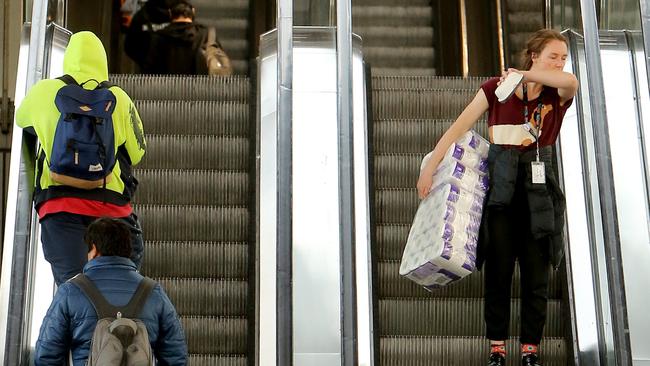
1.38pm: Market swings offer ‘window of insight’: MS
Yesterday’s wild market swings offer a “window of insight” into sectors most vulnerable from any increasing trade risk.
Comments from White House adviser Peter Navarro that the US, China trade deal was “over” sparked a drop in US futures and the local market – but were quickly clarified and trade resumed to normal.
Morgan Stanley’s Chris Nicol writes that the 30-minute blip offers some insight into the parts of the market potentially most at risk in any trade spat.
“The window of insight demonstrated the potential size of negative skew from this risk (initial ASX200 reaction down 1.6pc and AUD down 0.9pc) and also sector and stock reaction where technology, energy and discretionary fared worse and healthcare, staples and gold held ground,” he says.
“While the headlines were clarified and appropriately discounted, a useful readthrough has been provided surrounding this key risk to outlook.”
He notes that Challenger, Link, Vicinity Centres and Oil Search were among the largest downward moves during the blip, while Newcrest, Saracen and ResMed fared best.
Read more: Thumping data drives stocks and oil higher
Jared Lynch 1.28pm: Crown probe narrowed after Melco sale
A high-stakes inquiry into Crown Resorts and its suitability to operate its casino under construction at Barangaroo will resume immediately after the coronavirus halted it for the past two months.
But the Independent Liquor and Gaming Authority has narrowed the scope of the probe after the death of Hong Kong gambling tycoon Stanley Ho and his Melco Entertainment selling its entire stake in the listed Australian casino group.
The inquiry – which at one stage was expected to see James Packer and Mr Ho’s son Lawrence Ho give evidence, despite the pair never receiving a formal invitation – is now deemed safe to continue.
“After carefully considering the current COVID-19 situation, and Commonwealth and NSW Government advice and restrictions, the Authority considers it safe and practicable to resume the Inquiry’s work,” ILGA said in a statement on Wednesday.”
CWN last traded down 2.4pc to $9.95.
Read more: Gaming authority pushes on with Crown probe
1.01pm: Shares claw back to positive
Shares are holding only mildly higher after a brief dip into the red at midday, as US futures wind back following overnight gains.
At 1pm, the benchmark ASX200 is higher by just 3 points or 0.1 per cent to 5958.3.
Tech is still the standout, along with utilities, while a drag from energy and bank stocks is pulling the market lower.
CSL, Commonwealth Bank and the major miners are helping to support the market with mild gains, while Freedom takes a hit of 13pc after the departure of its CFO and temporary stand down of its CEO.
NAB, Westpac and ANZ are all trading in the red.
Here’s the biggest movers at 1pm:
Ben Wilmot 12.52pm: Village Roadshow in talks for state funds
Takeover target Village Roadshow has revealed that it is in talks with the Queensland government to provide funding that would support its famed theme parks as they head towards full reopening.
The unconventional measure comes as private equity group BGH Capital continues its due diligence on the company for which it lobbed a bargain takeover offer last month.
Village this month granted the Ben Gray-led BGH more time to undertake due diligence on its operations as part of its $468.5m takeover proposal.
A deadline of June 30 is fast approaching but the private equity house could also tap a further two-week extension.
However, US activist investor Mittleman Brothers last month struck a blow to BGH’s plan, labelling its takeover proposal opportunistic and criticising it for taking advantage of the coronavirus crisis.
VRL last traded down 1.1pc to $2.19.
12.23pm: RBNZ holds rates at 0.25pc
The central bank of New Zealand has kept rates flat at 0.25pc, as it pledged to continue with large scale asset purchases (LSAP) to keep rates low “for the foreseeable future” without ruling out further stimulus.
Its LSAP remains set at $NZ60bn, and includes the purchase of government bonds, local government funding agency bonds, and government inflation-indexed bonds.
The Committee said the balance of economic risks remained to the downside, with the LSPA to continue to reduce the cost of borrowing, though it was “not yet clear whether the monetary stimulus delivered to date is sufficient to meet its mandate”.
“Due to worldwide uncertainty about the pandemic containment, the possible negative outcomes remain severe and larger than any near-term upside surprises,” the committee said.
“Added to these concerns was the challenge of phasing out various Government support schemes – in particular the wage subsidy – which could lead to further job losses.”
The Monetary Policy Committee agreed to continue with the Large Scale Asset Purchase (LSAP) programme aimed at keeping interest rates low for the foreseeable future. The LSAP quantum remains set at $60 billion. The OCR remains at 0.25% 👉 https://t.co/Wxob6eDoaC #rbnz pic.twitter.com/YMfmi8zmbd
— Reserve Bank of NZ (@ReserveBankofNZ) June 24, 2020
Ben Wilmot 12.19pm: Mirvac slashes valuations
Property developer Mirvac has revealed sharp devaluations, cutting about $306m off its portfolio. The falls were confined to its hard hit retail business, which was down by close to 10 per cent.
The value shifts shows this sector remains the most vulnerable while office and industrial properties are holding up even as the coronavirus ravages the economy.
“COVID-19 has transformed the world in the space of a few short months. No sector has been untouched by the health and economic crises that have developed. These are unprecedented times and Mirvac is taking necessary measures to address these challenges including appropriate capital management,“ Mirvac chief executive Susan Lloyd-Hurwitz said.
MGR last traded down 1.7pc to $2.35.
Read more: Mirvac slashes mall values
12.02pm: Shares slip in light trade
Australia’s S&P/ASX 200 has pared all of a 0.6pc intraday rise.
It’s disappointing considering overnight futures had pointed to a 0.8pc rise but after the US share market faded significantly from intraday highs, there was little chance of the local bourse breaking resistance at 6000 points today.
At least share trading volume is light, suggesting the intraday fade is more to do with a lack of buying rather than heavy selling.
Volume is currently about 44pc below the 20-day average, which is very light for a Wednesday.
11.44am: AMP may be a target post-Life sale
AMP’s sale of its life insurance unit makes the group more attractive to a potential suitor, according to Bell Potter, who notes Macquarie, KKR or other private equity names may be eyeing a the wealth group.
Analyst Lafitani Sotiriou notes that the $2.5bn sale has de-risked a potential deal – “AMP has often been touted as a break-up or target, but for the first time we believe this is a live possibility by virtue of it being de-risked and cashed-up”.
“We believe if a deal is to happen, they would look to finalise it before AMP spends the excess capital its about to receive.”
Mr Sotiriou adds that Macquarie could be a potential suitor – “which would get meaningful synergies from overlap in three core businesses, with advice being spun-off into its own vehicle”, while KKR could be in the mix after its recent purchase of CBA’s Colonial First State or even another private equity firm looking to consolidate MLC or BT.
Bell Potter lifts its target price on the stock to $2.50 from $2.15, with a Buy rating.
AMP last down 3.4pc to $1.84.
Read more: Conditions imposed on AMP Life sale to Resolution
11.38am: Put-call ratio belies caution: Citi
Citi’s chief US equity strategist, Tobias Levkovich, warns that a “meaningful divergence has emerged” between the AAII (American Association of Individual Investors) measure of bearish sentiment and the CBoE total put-call ratio on the S&P 500.
His chart shows the two measures broadly track each other over time, but have diverged since March. It may suggest there’s a degree of complacency in the options market, despite the negative sentiment among traders surveyed.
“In this sense, there is a fascinating gap developing between statements of concern and not putting one’s money where his/her mouth is, as defined by buying protection,” Mr Levkovich says.
“Looking back historically shows a breakdown versus past periods. Individuals are clearly entitled to their opinions, but sometimes data has to intrude and force an adjustment to potentially ill-advised perceptions.”
He also says other indications like declining short interest, the premium prices clients are willing to pay for puts and trading volumes for NASDAQ versus the NYSE also “provide insight into more speculative conditions”.
“We suspect that too many fund managers do not want to miss the next possible Fed-induced S&P 500 advance, but now is not the time for such bravery, in our opinion,” Mr Levkovich adds.
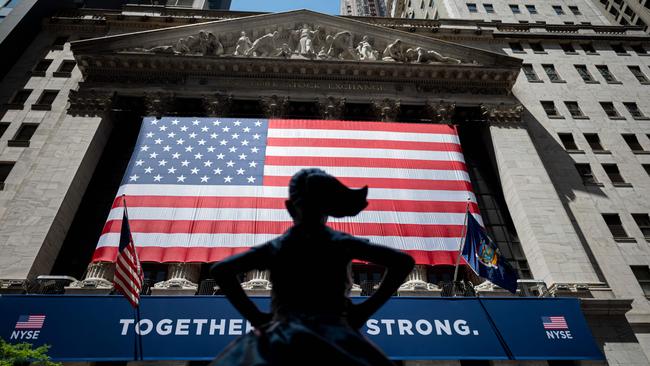
Gerard Cockburn 11.31am: APA declares 27c interim payout
APA says stable cash flows during the COVID-19 pandemic had enabled it to push through a final distribution of 27 cents per share for the second half of the year.
In combination with its interim dividend of 23 cents per share paid in March, the latest payout takes total distribution to 50 cents per share for the year.
The expected payout to shareholders is a 6.4 per cent increase compared to last year.
APA chief executive Rob Wheals said the company’s designation as an essential service allowed cash flows to remain stable during the downturn, allowing it to uphold its distribution commitment to investors.
“It’s been an extremely challenging year for everyone, both in Australia and globally, economically as well as personally for many,” Mr Wheals said.
“As a supplier of an essential service of gas transportation and energy generation, APA has the benefit of stable operating cash flows.”
APA last traded up 2.9pc to $11.62.
10.57am: Teoh spruiks merger ahead of vote
TPG chairman David Teoh has laid out plans to pay out a special dividend, as he touted the benefits of a merger with Vodafone and asked for shareholder support.
At an extraordinary general meeting of the telco today, held virtually in line with social distancing requirements, Mr Teoh said the merger brought together two highly complementary businesses, and the merged company would “become a more formidable competitor in the market”.
Alongside that, he laid out plans to pay a fully franked cash dividend between 49c to 52c per share if the deal was passed, and a Singapore dividend as it undertook a separation of its Singapore business.
If the scheme is approved, TPG said it expected to be heard in court on Thursday, with final implementation expected on July 13.
TPM last traded up 0.1pc to $8.99.
10.33am: Tech surges after Nasdaq records
Tech shares are surging higher in early trade, led by another record-breaking jump for Afterpay.
The market darling soared as much as 5pc in early trade to set new highs of $62.33 – marking a near seven-fold jump in the stock since its March trough of $8.01. It comes after the group reported last yesterday that its UK business Clearpay had reached one million active customers in the UK.
Appen too jumped 3pc to set a new high of $34.77 as Macquarie rated the stock at a new Outperform, with a target price of $38 per share.
Elsewhere in the sector, Xero is adding 1.9pc to $90.43, as Altium springs back from yesterday’s weakness – up 2.9pc to $33.75.
WiseTech is up 1.6pc to $22.36.
Read more: Pandemic powering Afterpay’s ascension
The Clearpay Day Sale is NOW ON! Support your favourite brands! Two days of online offers. Shop & #Clearpayit. Ends March 20th 🥰🙌 pic.twitter.com/sVPoHM05Ry
— Clearpay (@Clearpay_UK) March 19, 2020
10.26am: Rising risk of share correction: Macq
Macquarie’s Matthew Brooks sees increasing risk of an Australian share market correction given a rising second wave of COVID-19 infections in the US and reduced Fed liquidity in the context of high valuations.
While improving earnings estimates have helped share prices and Macquarie has more above-consensus than below-consensus earnings forecasts for FY20, he cautions that the Fed’s balance sheet contracted last week, driven by falls in Repo and Swaps.
Mr Brooks says the market has been less concerned by these falls “but when Fed liquidity has been a key support for equities, further shrinking of the Fed’s balance sheet would add to the risk of a correction”.
“Corporate bond purchases could offset the unwind of the remaining Repo and Swaps.”
He also points to “high valuations” in the Australian share market, where the current forward PE ratio of the ASX 200 at 19.3 times is 3pc above its pre-pandemic high. And the PE for the second year out of 17.0 times is only 4pc below its pre-pandemic high.
While noting that high valuations alone do not cause corrections, “they do make the market more susceptible to negative surprises,” Mr Brooks says.
One such potential negative surprise would be too rapid a withdrawal of fiscal stimulus in the US and Australia.
Macquarie’s model portfolio is “relatively defensive” with its cyclical exposure tilted to resources and better balance sheets, “in part due to the high valuations of Industrial stocks”.
10.13am: Shares edge higher
The local market is edging higher in early trade, marking a fourth day of gains.
At the open, the benchmark ASX200 is higher by 16 points or 0.27 per cent to 5970.6.
All sectors bar staples, industrials and real estate are higher, led by a 2.1pc jump in tech.
Afterpay is a standout, breaking through the $60 mark to hit a new record of $62.11 while Xero gains 1.6pc to $90.20.
The index has so far undershot a 0.8pc rise implied by overnight futures relative to fair value, mainly due to a sub-par performance from the major banks, though ANZ is up 0.5pc.
Also, Transurban fell 1.5pc after UBS downgraded to Neutral, while Woolworths fell 0.8pc on cost blowouts.
9.56am: Sonic tips flat earnings for FY20
Pathology group Sonic Health says its full year earnings are likely to be on par with the previous year, as its patient volumes for May and June rebound faster than anticipated.
The group said global patient volumes and revenues had dropped dramatically from the second half of March and into April, but things were looking up.
“Sonic’s trading results for March and April 2020 were substantially below forecast, with May results stronger than expected. This positive trend has continued through June to date,” it said.
As such, the group guided to similar earnings to the previous year, around $1.075bn, but said uncertainty meant it was still not in a position to forecast earnings for the year following.
At its half year results in February, before the pandemic hit, Sonic had guided to earnings growth of 6pc to 8pc for FY20.
9.44am: Freedom Foods chief takes leave
Freedom Foods chief Rory Macleod is on leave from the top job, prompting a management shake up just a day after CFO Campbell Nicholas resigned.
In a brief statement to the market, the health food maker said Mr Macleod was on leave “pending a further announcement”.
In his place, Perry Gunner had been appointed as executive chairman, and commercial director Brendan Radford as acting CEO.
Further, group general manager of corporate development, Stephanie Graham has been appointed as acting chief financial officer “while the board is evaluating permanent appointment processes”.
9.29am: Make use of capital buffers: ACFR
Australia’s Council of Financial Regulators has stressed the importance of continued credit flow for the recovery of the economy, encouraging banks to make use of their capital buffers to support business and households.
In its quarterly statement, the co-ordinating body of APRA, ASIC, Treasury and the RBA noted the importance of financial sector in cushioning the effects of the shutdown and supporting the economic recovery.
“Council members discussed the importance of the transition as the economy recovers and support measures, including temporary loan repayment deferrals, begin to be unwound later in 2020,” the council said.
“Members agreed that financial institutions, regulators and governments will need to continue to show flexibility in order to support the objectives of economic recovery, resilience of financial institutions, and fair household and business outcomes.”
9.26am: ASX to rise for fourth day
Australia’s share market looks set to rise for a fourth-consecutive day.
Overnight futures relative to estimated fair value suggest the S&P/ASX 200 will open up 0.8pc at 6001 points.
A positive close today would be the fourth in a row and a close above 5991.8 would mark a fresh two-week high on a daily close basis.
But while the S&P 500 rose 0.4pc overnight, the US benchmark closed near its intraday low after rising as much as 1.2pc. Similarly, while the Nasdaq rose 0.7 per cent to a record high close of 10131.37, it erased most of a 1.6pc intraday gain.
Also, the 3155 resistance level on the S&P 500 equates to 6000 points on S&P/ASX 200 and there’s little reason to expect much independent strength today.
9.05am: No payout likely after AMP sale: MS
Now that AMP’s Life sale is complete, the firm has several options for the extra cash, but don’t expect a dividend, according to Morgan Stanley.
Analyst Andrew Stadnik writes that AMP has already flagged spending the proceeds on paying down debt ($800m), paying Life separation costs ($400m), funding capital dis-synergies ($200m) and some further amount to fund investment on the new AMP.
Still, that leaves a significant portion of the $2.5bn sale remaining.
Mr Stadnik notes the rest of the funds could be used to support growth in its seed capital arm or AMP Bank, to increase exposure to the Wealth industry as competitors exit, or provide a safety buffer from its ongoing client remediation program.
As a fourth option, he notes the group could resume paying a dividend, but adds that “we don’t have a return of capital in our forecasts”.
AMP last traded at $1.91.
Read more: Conditions imposed on AMP Life sale to Resolution
8.49am: What’s on the broker radar?
- Altium cut to Lighten – Ord Minnett
- AMP target price raised 16pc to $2.50 – Bell Potter
- Appen rated new Outperform – Macquarie
- Cassini cut to Hold – Ord Minnett
- Liontown Resources rated new Speculative Buy – Bell Potter
- OZ Minerals target price raised 10pc to $11.50 – Cannaccord
- Premier Investments cut to Sell – Morningstar
- Qube cut to Hold – Jefferies
- Qube cut to Reduce – Morgans
- Qube target price raised 28pc to $3.30 – Morgan Stanley
- Regis Healthcare target price cut 29pc to $1.50 – UBS
- SCA Property cut to Hold – Jefferies
- Transurban cut to Neutral – UBS
- Western Areas raised to Overweight – JP Morgan
8.32am: Coronado flags charge
Coronado Global Resources signalled a $US60m-$US70m impairment charge of its Greenbrier coal mine in the US, while reinstating annual production guidance.
The impairment followed a review of market conditions, customer demand and current metallurgical coal pricing, and Coronado said it would recognise the charge in its results for the six months through June. Greenbrier has been offline for some time, and production isn’t likely to restart this year.
Coronado recently began producing coal again from the Buchanan and Logan mines —its two largest in the US —following coronavirus-driven shutdowns. Management now expect total saleable production in fiscal 2020 of 16.5 million-17.0 million metric tons.
“However, the group sales volumes are expected to be higher than production as customer demand is met through existing inventory levels,” Coronado said.
Dow Jones Newswires
8.25am: Car bosses ordered to settle suit
A federal judge took a remarkable step by ordering the CEOs of General Motors and Fiat Chrysler to meet and settle a lawsuit over whether one company got a competitive edge over the other when union leaders were showered with cash and other perks.
GM has accused Fiat Chrysler of racketeering, saying the rival won labour concessions during contract talks because United Auto Workers officials were bribed with money from a job training centre.
US District Judge Paul Borman ordered GM chief executive Mary Barra and her Fiat Chrysler counterpart, Mike Manley, to meet in person by July 1 “to reach a sensible resolution of this huge legal distraction.”
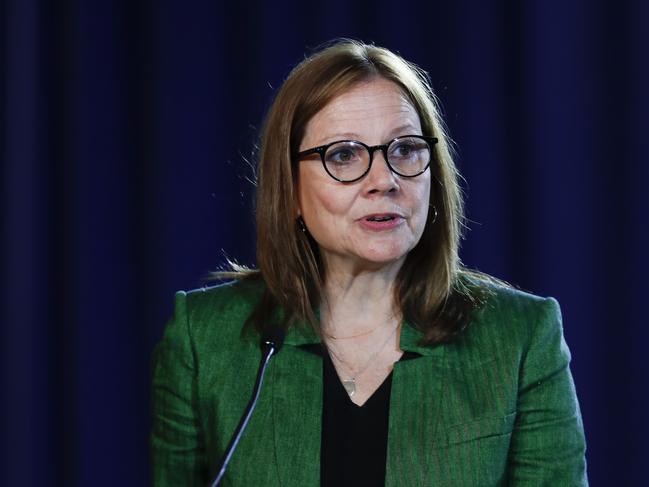
“What a waste of time and resources, now and for the years to come in this mega litigation, if these automotive leaders and their large teams of lawyers, are required to focus significant time-consuming efforts to pursue this ‘nuclear option’ lawsuit, if it goes forward,” Borman said.
He said he wants an update from Barra and Manley at noon on July 1.
AP
8.07am: US indexes diverge
The divergence in the performance of the major US stock indexes this year is the widest in more than a decade.
A surge in big technology stocks has helped the Nasdaq Composite rally 13pc in 2020, while the Dow Jones Industrial Average of blue-chip stocks is down 8.3pc. The benchmark S&P 500 is hovering in between them, off 3.1pc.
The Nasdaq’s advantage over the Dow and S&P 500 is the biggest since 1983. The gap between the S&P 500 and the Dow is the widest since 2002, when the Dow was ahead.
The Nasdaq continued its outperformance Tuesday, outpacing the Dow and S&P 500 for the day and notching its 21st record close of 2020. The index climbed 0.7pc, while the Dow edged up 0.5pc and the S&P 500 added 0.4pc, driven by improving economic data.
One explanation for the gap in returns: A handful of growth stocks that have surged this year have an outsize influence on the Nasdaq and the S&P 500. Apple Inc., Microsoft Corp., Amazon.com Inc., Google parent Alphabet Inc. and Facebook Inc. together account for about 40pc of the Nasdaq and 20pc of the S&P. Of those stocks, only Apple and Microsoft are in the Dow.
Dow Jones
8.00am: Copper gains on Trump, data
Copper prices rose overnight after US President Donald Trump said a trade deal with China was “fully intact” and stronger-than-expected European and US data bolstered hopes of a rapid economic recovery.
Benchmark copper on the London Metal Exchange was up 0.5 per cent at $US5,907 a tonne, nearing a five-month high of $US5,928 reached earlier in June.
The metal used in power and construction has surged 35 per cent from a low in March.
Powering that rise is an almost total recovery of demand in top consumer China and increasing supply disruption in Chile, the biggest producer, said Julius Baer analyst Carsten Menke.
But he said prices were unlikely to return quickly to January’s pre-COVID high of $US6,343.
Reuters
7.55am: Oil slips
Oil futures slipped overnight as the market braced for reports expected to show swelling US crude inventories, which pulled prices back from the highest levels since before the coronavirus pandemic slammed fuel demand.
Prices rose early, after US President Donald Trump wrote in a tweet late Monday that the trade agreement with China was “fully intact”. Markets had been unsettled by surprise comments from White House trade adviser Peter Navarro that the hard-won deal with China was “over”.
But crude benchmarks declined in afternoon trade on expectations US inventories will hit a record high for a third week in a row, undermining recent bullishness among investors.
Brent futures fell 45 US cents, or 1.0 per cent, to settle at $US42.63 a barrel, while US West Texas Intermediate (WTI) crude fell 36 US cents, or 0.9 per cent, to $US40.37.
Reuters
7.50am: Pandemic pulls Serko to loss
Corporate travel company Serko has posted a full-year net loss of $NZ9.4m, blaming the coronavirus pandemic and increased operating expenses.
It declined to provide guidance for the year ahead.
Serko said total operating revenue rose 11pc to $NZ25.9 million, up $NZ2.5 million from the prior year. But operating expenses increased 59pc to $NZ37.1 million, reflecting investment in a planned international expansion.
The COVID-19 pandemic took a toll on business travel.
Acting chair Claudia Batten said: “Government responses to the pandemic worldwide, including lockdowns and the suspension of all non-essential travel, continue to have a material adverse effect on booking transaction volumes on Serko’s online travel booking platforms, which generate the majority of Serko’s revenue.
“It should, however, be noted that Serko has carefully chosen to retain resource and capacity on key growth initiatives to ensure we are well positioned to participate in the recovery of corporate travel.”
7.20am: ASX to rise early
Investors are likely to see slight gains early on the Australian share market after improving economic data helped Wall Street edge higher.
At 7am (AEST) the Australian SPI 200 futures contract was higher by 4.0 points, or 0.07 per cent, to 5,929.0.
In the US, Wall Street’s three major indices closed higher after data showed the pace of contraction in the US manufacturing and services sectors slowed in June as businesses reopened after lockdowns that started in mid-March. New home sales in the US jumped 16.6 per cent in May, blowing past estimates of a 2.9 per cent rise.
In Australia, internet provider TPG will hold an extraordinary general meeting and ask shareholders to vote in favour of its proposed merger with Vodafone. A merger would create a substantially stronger competitor to Telstra and Optus.
The benchmark S&P/ASX200 index finished Tuesday up 9.9 points, or 0.17 per cent, at 5,954.4, while the broader All Ordinaries closed up 11.3 points, or 0.19 per cent, at 6,069.3.
At 7am (AEST) the Australian dollar was buying US69.30 cents, up from US69.09 cents at the close of trade on Tuesday.
AAP
6.10am: Wall St rises on positive data
Wall Street rose as improving economic signals in the US and overseas added to optimism for recovery from the coronavirus-induced slowdown.
The S&P 500 gained 0.4 per cent and the Dow Jones Industrial Average added 0.5 per cent. The tech-heavy Nasdaq Composite rose 0.7 per cent, boosted by gains in Apple and Amazon shares.
After yesterday’s small gains, the ASX is set for a modest early rise, with the SPI futures index up 10 points, or 0.2 per cent, at 6am (AEST).
The US economy has been hit hard by the coronavirus and related shutdowns, leaving investors to parse various data sources for signs of when business activity and corporate earnings can be expected to pick up.
“We’re watching the recovery and the process of the US states reopening the economy very closely,” said Katerina Simonetti, senior portfolio manager at UBS Private Wealth Management. “It’s trial and error: They’re trying different things, seeing if they work or not. Assuming that it would work, we expect a sustained economic recovery for the third or perhaps fourth quarter of this year.”
On Tuesday, preliminary results from IHS Markit data showed that business activity in the US private sector improved for a second consecutive month in June, though it remained in contraction territory. In another positive sign, sales of new homes jumped sharply in May, according to Commerce Department data.
The data on new home sales will be interpreted as an indication of consumer confidence, according to Georgina Taylor, a multi-asset fund manager at Invesco.
Overseas, the pan-continental Stoxx Europe 600 rose 1.3 per cent after data from France suggested a stronger-than-expected recovery after lockdown measures were lifted. Activity levels in the broader eurozone also improved to their highest level since February, though the indicators continued to signal a contraction.
“What matters is acceleration in the growth rate of this data. We weren’t expecting to see the acceleration for a few months, but there are signs that we’re already getting some now,” said Sebastien Galy, a macro strategist at Nordea Asset Management. “That’s very positive for the equity market.”
Major indexes have bounced about 40 per cent from their March lows, leaving the broad S&P 500 index off 2.6 per cent in 2020. Some money managers and strategists caution this could point to additional volatility ahead, given that prices have rebounded while expectations for corporate earnings are significantly lower than before the coronavirus.
Overnight, US futures and Asian stock markets were buffeted by conflicting signals from the Trump administration on the trade deal with China. White House trade adviser Peter Navarro sparked confusion among investors when he told Fox News that the agreement was “over” in a Monday evening interview. President Trump then tweeted to say the deal was “fully intact.”
The Shanghai Composite Index gained 0.2 per cent, and Hong Kong’s Hang Seng index climbed 1.6 per cent.
Dow Jones Newswires
5.50am: Segway puts brake on transporter
Segway, which boldly claimed its two-wheeled personal transporter would revolutionise the way people get around, is ending production of its namesake vehicle.
The Segway PT, popular with tourists and police officers but perhaps better known for its high-profile crashes, will be retired on July 15, the company said in a statement.
“Within its first decade, the Segway PT became a staple in security and law enforcement, viewed as an effective and efficient personal vehicle,” said Judy Cai, Segway president, in a statement, noting that in the past decade it gained popularity with vacationers in major cities in North America, Europe, Asia, South America, and the Middle East.
But the Segway, which carries a standing passenger on a wide platform, accounted for less than 1.5pc of the company’s revenue last year. The company said 21 employees will be laid off, another 12 employees will stay on for two months to a year and five will remain at the Bedford, New Hampshire facility. “This decision was not made lightly, and while the current global pandemic did impact sales and production, it was not a deciding factor in our decision,” Cai said.
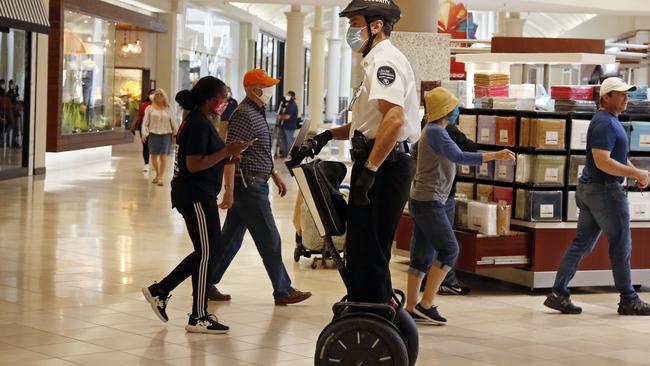
AP
5.45am: French gourmet grocer Fauchon fails
France luxury grocer Fauchon, famous for exquisite chocolates and fine teas, has asked for its core Paris operations to be placed into administration after sales were hit by the coronavirus epidemic, it said.
The company said it had asked a court to “to start a procedure of placing into administration” its Paris shops and headquarters.
It said sales had been “badly impacted” not just by the months-long closure of stores amid the coronavirus lockdown but also the effects of the yellow vest protests of 2018-2019 and strikes over pension reforms this winter.
As a result, operating costs at the Paris shops had become “unsustainable”, a statement said.
Its main outlets on Place de la Madeleine in central Paris, where Fauchon opened in the late nineteenth century, is usually a magnet for well-heeled tourists from around the world.
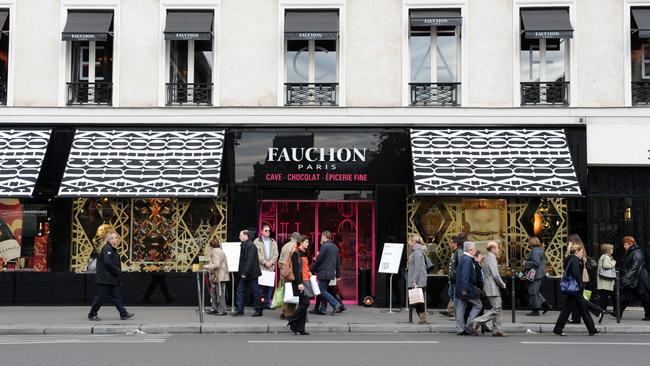
AFP
5.40am: Markets rally on upbeat data
European and US stocks rallied as data boosted hopes of a quick economic recovery, while President Donald Trump dampened fears of a US-China trade deal collapsing.
“Better-than-expected figures have bolstered the existing recovery in risk appetite … with overnight markets shrugging off the brief panic induced by some unguarded comments by (Trump Adviser) Peter Navarro regarding the US-China trade deal,” said Chris Beauchamp, chief market analyst at IG trading group.
Private sector economic activity in the eurozone and UK shrank further in June but the rates of decline slowed compared with the worst of the coronavirus lockdown, IHS Markit said Tuesday.
“Output and demand are still falling but no longer collapsing,” said Chris Williamson, chief business economist at IHS Markit. IHS Markit’s measure of private sector economic activity also bounced back sharply, even if it shows the economy is contracting.
“US investors got the best reading possible, PMI data strongly rebounded, but didn’t outperform like Europe, calming any thoughts that maybe fiscal and monetary authorities may not keep the stimulates floodgates open,” said market analyst Edward Moya at online currency trading platform Oanda.
Trump has meanwhile countered comments by Navarro, one of his top economics advisers, who said the China-US trade deal was “over”.
The main European markets gained more than one per cent. London gained 1.3 per cent, Frankfurt rose 2.1 per cent and Paris was up 1.4 per cent.
Oil prices, which had fallen around two per cent on Navarro’s remarks, rebounded Tuesday by similar amounts before paring gains.
AFP
5.35am: Judge bars Roundup cancer warning
A US judge permanently barred California from placing a cancer warning on Bayer’s Roundup, handing a victory to the German company as it battles litigation over the product.
The case concerned California’s Proposition 65, which requires a warning on products known by the state to cause cancer.
Although a World Health Organisation body in 2015 classified glyphosate, which is used in the herbicide Roundup, as “probably carcinogenic,” US District Judge William Shubb said there are “several other organisations,” including the US Environmental Protection Agency and other WHO bodies that “have concluded there is insufficient or no evidence that glyphosate causes cancer.” The warning that glyphosate is known to California to cause cancer is “misleading” and such statements are not “purely factual and uncontroversial,” Shubb said in a 34-page ruling.
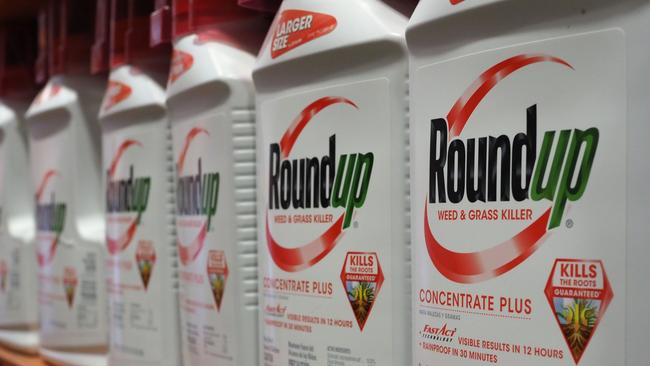
AFP
5.30am: Boeing contractor’s warning
Boeing contractor Spirit Aerosystems has warned regulators it could violate its agreements with creditors as it grapples with the grounding of the 737 MAX and the coronavirus pandemic.
In a filing with the Securities and Exchange Commission, Spirit, which makes fuselages for the best-selling Boeing model that was grounded worldwide following two fatal crashes, said the plane maker has asked it to cut production further on the MAX.
“The reduction is due to COVID-19’s impact and accumulated inventory of Spirit’s B737 products; such inventory was accumulated pursuant to the parties’ prior production rate agreements,” Spirit said in the filing.
“Given the substantial production plan reduction, Spirit could breach the financial covenants under its credit agreement in the fourth quarter of 2020 without an amendment or waiver,” the company said, adding that they were in communication with their lenders.
Spirit said it was about $US3 billion in debt, according to its most recent regulatory finding, including $375 million borrowed in February to offset the hit from the suspension of MAX flights.
The company said Boeing had requested it cut the number of parts to be delivered in the year to 72 from 125, 35 of which have already been shipped.
Earlier this month, Spirit said it would furlough staff after Boeing asked it to stop working on four 737 MAX planes and to avoid starting production on 16 others scheduled to be delivered this year.
AFP
5.25am: US new home sales surprise
Sales of new homes rose a surprisingly strong 16.6pc in May with the reopening of major parts of the country potentially fuelling activity in the housing market.
The Commerce Department reported Tuesday that sales of new single-family homes rose to a seasonally adjusted annual rate of 676,000 last month. That was a much better performance than expected. Many economists had forecast that sales would fall in May.
The new home sales numbers come just one day after the U.S. reported a 9.7pc plunge in May sales of existing homes to an annual rate of 3.91 million, the slowest pace in nearly a decade.
There are hopes that the housing slump that occurred with the virus shutdowns could be coming to an end, though the millions of jobs lost to the pandemic could impede any rebound.
AP
5.20am: Wirecard ex-CEO arrested
The former CEO of German payment service provider Wirecard has been arrested, accused of inflating the company’s balance sheet in an accounting scandal that centres on a missing sum of 1.9 billion euros ($US2.1 billion), prosecutors in Munich said.
Markus Braun resigned on Friday after the company said that auditors couldn’t find accounts containing the money. On Monday, Wirecard said it has concluded that the money probably doesn’t exist.
Prosecutors said a court issued an arrest warrant shortly afterwards and Braun, who had been in Vienna, turned himself in on Monday evening. He is accused of inflating the company’s balance sheet and revenue using sham income from business with third-party acquirers, “possibly in collaboration with further perpetrators,” in order to “portray the company as financially stronger and more attractive for investors and clients,” they said in a statement. Braun, an Austrian who had led Wirecard since 2002, was arrested on suspicion of incorrect statements of data and market manipulation.
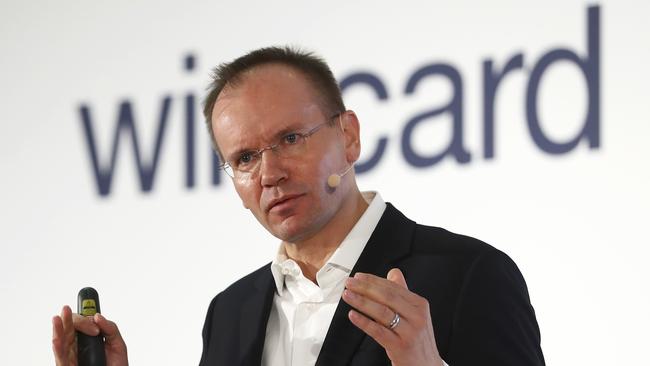
AP

